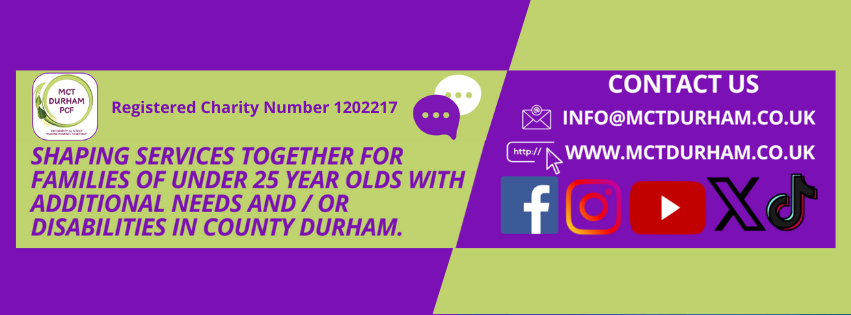In County Durham, the Neurodevelopmental Diagnostic Assessment Service for children and young people aged between 5 - 17 years old is provided by Tees Esk and Wear Valleys NHS Foundation Trust.
Referral forms will only be accepted from a Professional who has worked with the child or young person and their family to complete the form together. Please note that the referral form and process were updated on 3rd November 2025. Click here to download the referral form.
If you are a Professional please click here for more information.
In County Durham, the Neurodevelopmental Diagnostic Assessment Service for children and young people aged between 5 - 17 years old is provided by Tees Esk and Wear Valleys NHS Foundation Trust.
The service offers diagnostic assessments for Autism, ADHD, and combined assessments for both Autism and ADHD.
The service does not currently offer diagnostic assessments for any other neurodevelopmental condition.
What’s Changed?
All new referrals for neurodevelopmental diagnostic assessment (ADHD, Autism, or combined ADHD and Autism diagnostic assessment) must follow a needs-led approach:
· Before making a referral, families must meet with a Professional who knows the child well—this could be from Education, Health or Social Care.
· A school teacher, nursery teacher, a member of the Health Visiting team or the social worker supporting the family are all examples of Professionals who may know the child well.
· If your child is not in education, please speak with a professional involved in your child’s care currently or that has been in previous years, to support you with your referral or email the Neurodevelopmental Assessment Team for advice
· Together, the family and the Professional will complete the Needs Led Planning Tool. This helps identify the child’s needs and explores support options. This may include supporting children and their families to access services without requiring them to have a clinical diagnosis.
· If it is agreed that a neurodevelopmental diagnostic assessment is appropriate, the referral form must be completed by the Professional and submitted.
Key Changes to the New Referral Form and Process
There is now a checklist on the front page of the referral form to guide the Professional and the family through the needs led approach. Each of the steps must be completed before the referral form can be submitted.
The Professional must use the Needs Led Planning Tool. It should be completed collaboratively by Professionals with families.
The Needs Led Planning Tool isn't available to download from this website. Professionals should already have this tool, however if any Professional does not, they should contact tewv.northdurhamneuro@nhs.net using their work email address to request a copy. This Needs Led Planning Tool will be uploaded onto the Family Hub Platform in November 2025.
Why are these changes being made?
All system delivery partners within the County Durham Care Partnership are committed to ensuring that services are accessed by the right people at the right time — and that families receive support based on need.
The Neurodevelopmental Assessment Team have worked in partnership to develop and introduce a new referral process for children and young people aged 5 to 17 years old across County Durham.
This information was provided by the Service Manager of the County Durham and Darlington Neurodevelopmental Diagnostic Assessment Service, Tees Esk and Wear Valleys NHS Foundation Trust
CAMHS Durham and Darlington Neurodevelopmental Assessment Service is a community mental health service for children and young people in County Durham and Darlington, offering specialist screening and assessments in relation to social communication and attention difficulties.
The Durham and Darlington Diagnostic Assessment Service is delivered by Tees Esk and Wear Valleys NHS Foundation Trust (TEWV). For information see the CAMHS Durham and Darlington Neurodevelopmental Assessment Service website.


